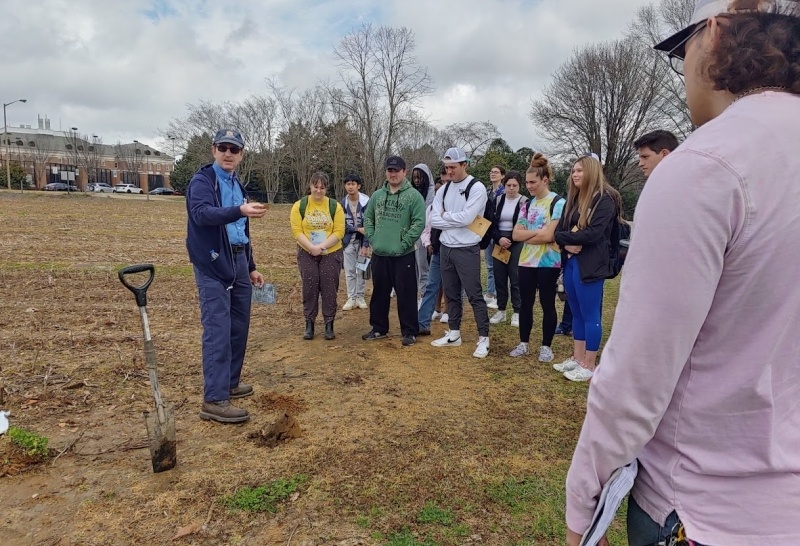Students in Sustainability Studies complete campus projects

Students in the sustainability studies minor capstone course worked on several campus improvement projects this semester. Working with community partners, students had the opportunity to employ a range of real-life sustainability solutions, such as improving the sustainability of campus research labs, improving signage at the Kreher Forest Ecology Preserve, understanding student perceptions of a plant-based diet and improving the campus landscape plan.
Students enrolled in the capstone class, SUST 5000, are graduating seniors pursuing a minor in sustainability studies. The class is the centerpiece experience of the minor, which is open to students from all majors across campus. The course gives students the opportunity to put what they have learned in the Sustainability Studies program to use solving a practical sustainability problem.
“These collaborative efforts not only create outlets for students passionate about sustainability but provide new opportunities and new ways of thinking that help drive change on campus and in the greater community,” said Miriam Wyman, sustainability studies instructor.
One of the projects, Plant it Forward, was a study to better grasp the contexts for a plant-based diet lifestyle choice. Students working on the project implemented a case study in a campus dining hall to better understand student perceptions and acceptance of plant-based food options at Auburn. The students worked to quantify and represent the emissions that are occurring through implementing a plant-focused dining experience, taking into consideration the reduction of meat products and influence of local food sourcing.
Jiha Yoon, who worked on the project, said it was an important learning opportunity.
“It’s a great experience to have a chance to introduce people to sustainable foods such as veggie-based food. Also, we are making some posters about why we need to seek veggie-food rather than meat-based food,” Yoon said. “Thanks to those posters, we hope students can consider it carefully and make a change in their diet. I am so glad to join the project and make a significant change in food sustainability for the school.”
Another project, Nature RX, focused on mental health, safety, social interactions and the preservation of native plants. The project analyzed Auburn University’s Landscape Master Plan to inform and incentivize the development of additional landscaping in the form of pocket parks. Using the 2016 Landscape Master Plan and a tailgating map, the objective of the project was to select 10 underutilized outdoor spaces for proposed pocket park designs. The sites considered student and facility opinions regarding the likelihood of use and the type of spaces lacking on Auburn University’s current campus design. The proposed design included detailed information and maps for lighting, outdoor furniture placement and vegetation.
Carla Slabber noted that the project gave students the opportunity to explore sustainability issues at multiple scales.
“This project has not only shown us some amazing places that Auburn is already creating outdoors but also revealed the opportunities for growth,” Slabber said. “Auburn’s campus has the potential to be among the best and most unique campuses when it comes to the creation of pocket parks, and it is great to be able to explore that and show the opportunities of a variety of scales of spaces.”
Every year, the sustainability studies capstone projects focus on local sustainability projects that integrate all the dimensions of sustainability, including the environment, society, culture, economics and equity. One of the hallmarks of the program is the opportunity for students to apply what they have learned in the classroom in their various fields and in the Sustainability Studies minor.
“The capstone projects allow students to work on a single project with other students from very different fields,” said Academic Sustainability Director Rebecca Retzlaff. “One project may have students majoring in engineering, history, interior design and biology. Working with different disciplines on sustainability projects gives our students a unique perspective on multidisciplinary and integrative sustainability work and sets them apart from other job applicants when they graduate.”
For more information about the minor, visit the Academic Sustainability Program website.






